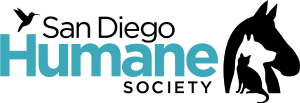Potty Training for Puppies & Adult Dogs
Both young puppies and adult dogs can struggle with potty training. Management, reinforcing (or rewarding) behavior you want to see and establishing a solid routine are often the key elements to creating a more regular potty schedule.
When it comes to potty training, it’s also important to be mindful of how long your dog can “hold it.” Bladder size does make a difference! Small dogs and older dogs need to go out more. If you are unsure of your pup’s bladder capacity, take them out more often than you think you need to until you both have a routine that works. For puppies, the general rule of thumb is that they can hold their bladder for as long as their age in months plus one (e.g. a 3-month-old puppy needs to go out every four hours).
Management
-
While potty training, contain your dog to a fail-safe zone where you can keep an eye on them. If you can’t watch them, keep them in a crate (check out our Crate Training Tips!). Baby gates, closed doors and exercise pens are other management tools we can use, or you can keep them on leash so you’re only an arm’s length away at all times.
-
Many dogs will give a signal before they have an accident inside like sniffing the floor, restlessness, whining or a sudden break from training or play. When you see them doing any of these behaviors, head outside with treats in hand!
Training, Reinforcement & Routines
-
Accidents are just that, accidents. Never punish your pet or they may become fearful of going potty around you.
-
Reward them with a treat immediately after they finish pottying. Dogs learn based on immediate cause and effect, so if you ask them to sit or come after going potty before you give them a treat, they may associate getting the treat with one of the other cues instead of going potty.
-
Dog not going when outside? Take them out on a leash (even in a fenced yard) and bring them to their potty spot. If they don’t go within five minutes, go back inside.
-
Watch for signals/wait a few minutes and go outside to their potty spot again.
-
Only once they go potty (and receive their treat), they get to go for a walk or go off-leash to play in the yard. As they learn the routine, the walk or playtime takes the place of the food reward.
-
-
Clean up any accidents with a pet-specific enzymatic cleaner such as Nature’s Miracle, which breaks down the smell and helps prevent re-marking in the same spot.
Have more questions? Check out our in-depth troubleshooting article here: Puppies: Potty Training.

